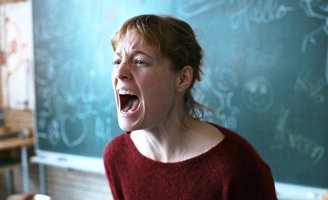 A junior high school in Germany is a microcosm of society in The Teachers’ Lounge, a film directed by İlker Çatak, and written by Çatak and Johannes Duncker.
A junior high school in Germany is a microcosm of society in The Teachers’ Lounge, a film directed by İlker Çatak, and written by Çatak and Johannes Duncker.
There have been a series of thefts from teachers in the school, and administrators don’t have much to go on. When two kids on the student council are questioned, they cast suspicion on a boy of Turkish ethnicity. An administrative teams goes into a classroom, orders all the girls to leave, then has the boys give up their wallets to be searched. The Turkish kid is found to be carrying a large amount of cash. But this ends up being a false lead, and in addition makes the school look bad.
The classroom that was disrupted by this maneuver is that of a teacher named Carla, played by Leonie Benesch. Unhappy at the way this was handled, Carla decides that she will try to identify the real culprit in the thefts. Money and valuables had been stolen from some teachers’ belongings, so in the teachers’ lounge one day, she turns on a video camera in her open laptop, then leaves her coat with a wallet in a pocket as she exits the lounge for a time. Sure enough, when she comes back to the room, there’s money missing from the wallet. Then she looks at the video. It shows someone going into the coat pocket, but the only identifier she can see is the thief’s light shirt with a pastel colored star pattern. So Carla walks around nearby looking for such a pattern, and finally seeing it on the blouse of the school secretary. She confronts the secretary, who becomes furious, then she goes to the principal. The secretary is called in and shown the video. At this point we might expect her to confess, but instead she acts shocked and angry that she is being accused. She then gets fired. When the truth about the incident comes out, some are offended at Carla’s use of a hidden camera, which actually violates school privacy rules, Thus begins a crisis that ends up seeing everybody—teachers, parents, administrators, students—picking sides and pointing fingers.
I remember Benesch from one of my favorite TV series, Babylon Berlin. Here she gives a performance of intense concentrated energy, trying to stay centered in the midst of a swirling controversy. The film is a subtle, involving, and believable drama, with an occasional hint of low-key satire. The issues of who holds the power, of what really constitutes proof, of the rights of children, of what are true principles and what are just prejudices, are all conveyed against the small-scale background of this 7th grade class.
The focus ends up being on one of Carla’s favorite students, Oskar, the son of the accused secretary, who begins acting out in rage against what he says is a false accusation against his mother. The difficult dynamic between Carla and Oskar becomes the central symptom of dysfunction, rather than the supposed mystery of who was stealing. There’s a stubbornness and defiance in this boy’s heart that ultimately is a greater force than everyone in the school united against him. The Teachers’ Lounge wisely leaves us without trite answers, but only with an agonized self-questioning for those who seek to wield authority over others.

Luca Guadagnino’s lovely film tells of the romance between a 17-year-old boy summering in 1983 Italy with his parents, and a 24-year-old American man...

Chris Dashiell names his favorite films that were released last year. There were some miraculous films in 2018. I’ve learned to be grateful, and...

Mayhem can be fun. In a movie, I mean, not in real life. There’s a subgenre of crime films in which hapless characters get...